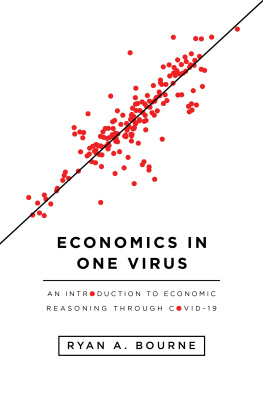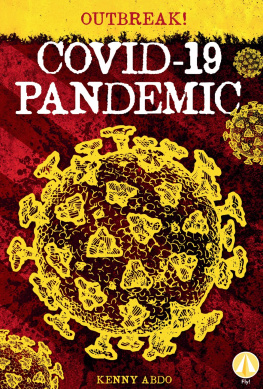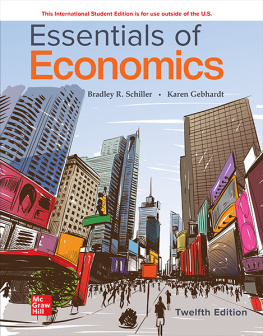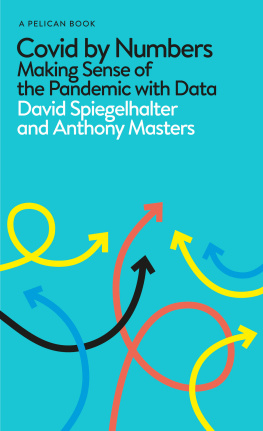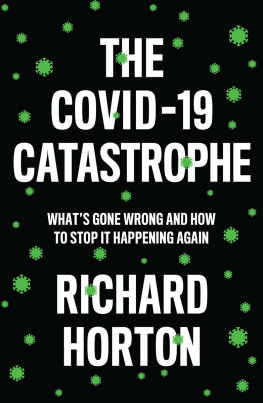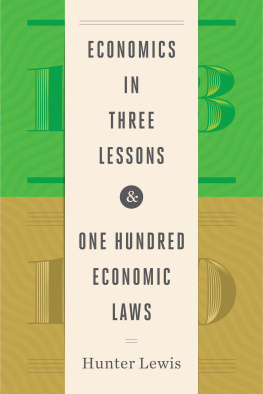Contents
Page List
Guide
ECONOMICS IN ONE VIRUS
The generous support of the Lazy L Foundation helped make this book possible.
ECONOMICS IN ONE VIRUS
AN INTRODUCTION TO ECONOMIC REASONING THROUGH COVID-19
RYAN A. BOURNE
Copyright 2021 by the Cato Institute.
All rights reserved.
Print ISBN: 978-1-952223-06-8
eBook ISBN: 978-1-952223-07-5
Cover design: Faceout Studios, Molly von Borstel.
Library of Congress Cataloging-in-Publication Data
Bourne, Ryan, author.
Economics in one virus : an introduction to economic reasoning through COVID-19 / Ryan A. Bourne.
pagescm
Washington, D.C. : Cato Institute, 2021.
Includes bibliographical references and index
ISBN 9781952223068 (paperback) | ISBN 9781952223075 (ebook)
1. LCSH: COVID-19 (Disease)Economic aspectsUnited States.
2. COVID-19 (Disease)Government policyUnited States.
3. Economic policyCase studies. 4. United StatesEconomic conditions2009 5. United StatesEconomic policy2009
LCC RA644.C67 B68 2021
DDC 362.1962/41400973dc23 2020054419
Printed in the United States of America.
1000 Massachusetts Avenue NW
Washington, DC 20001
www.cato.org
CONTENTS
WHAT DOES IT MEAN TO BE ECONOMICALLY WORSE OFF DURING A PANDEMIC?
An introduction to economic welfare
SHOULD I BE FREE TO RISK INFECTING YOUR GRANDMA WITH A DEADLY VIRUS?
An introduction to externalities
DID WE CLOSE DOWN THE ECONOMY?
An introduction to public and private action
HOW MUCH WOULD YOU SPEND TO SAVE MY LIFE?
An introduction to the value of a statistical life
WHEN IS A LOCKDOWN CURE WORSE THAN THE DISEASE?
An introduction to cost-benefit analysis
WHY WAS I BANNED FROM GOING FISHING?
An introduction to thinking on the margin
WHAT GOOD IS A PANDEMIC PLAN WITH SO MANY UNKNOWNS?
An introduction to uncertainty and the knowledge problem
WHY DID PROTESTS AND MARCHES NOT LEAD TO OBVIOUS SPIKES IN COVID-19 CASES?
An introduction to endogeneity
WHY COULDNT I GET A COVID-19 TEST BACK IN FEBRUARY AND MARCH 2020?
An introduction to regulatory tradeoffs
WHY WAS THERE NO HAND SANITIZER IN MY PHARMACY FOR MONTHS?
An introduction to the price mechanism
DOES THE PANDEMIC SHOW THAT WE NEED MORE U.S.-BASED MANUFACTURING?
An introduction to trade and specialization
WHY IS THAT GUY IN THE MASK GETTING SO CLOSE?
An introduction to moral hazard
WHY DID AIRLINES GET A SPECIAL BAILOUT BUT NOT MY INDUSTRY?
An introduction to public choice economics
WHY DIDNT MY WORKERS WANT TO BE REHIRED?
An introduction to incentives
WHY WERENT WE WELL PREPARED FOR THE PANDEMIC?
An introduction to political incentives
CAN WE REALLY JUST TURN AN ECONOMY OFF AND BACK ON AGAIN?
An introduction to the nature of an economy
INTRODUCTION
N othing brought home the fear associated with COVID-19 more than my baby niece exhibiting symptoms of the disease. Just a year old, one evening in late March 2020 she developed a 104F fever. She was restless and uncomfortable for much of the night, before the hacking, dry cough associated with the disease started. Later came vomiting and shivering. Doctors by telephone urged her parents to keep her home and comfortable and only call for help if her symptoms worsened.
They did worsen. The next day, she struggled to breathe. This time she was rushed by ambulance to the nearest hospital, an experience shed repeat two nights later. Observed in outdoor COVID-19 tents to avoid risking infecting others, she was admitted and stabilized on both occasions but wasnt tested for COVID-19 because of limited testing capacity in the UK at that time.
Slowly she recovered. Yet three weeks later, a body rash developed and a fever came again, requiring a third admittance to the hospital. Doctors said her symptoms matched those of other children who had recovered from COVID-19 and then suffered from a secondary condition known as pediatric multisystem inflammatory syndrome.
Those were scary times for my family. We often overlook the anxiety people have had to deal with owing to this disease or its threat, even beyond the losses of life Americans have had to endure. But, with my niece now recovered and happy, I recognize that although we were unlucky that she experienced such severe symptoms at her age, we were more fortunate than many families. Hundreds of thousands of others whose loved ones contracted this virus in the United States, particularly those with elderly relatives, have suffered dreadful losses.
But it hasnt just been the health impacts or fear of the disease that have shaken the country. My guess is that the virus called SARS-CoV-2, which causes the disease COVID-19, coupled with our social and political reaction to it, has profoundly disrupted your everyday life, too, even if you havent had a family member contract it.
Maybe you lost your job. Maybe you had to work from home and juggle what you do for a living with playing teacher to your kids. Maybe your business failed or barely survived with the help of a government loan or grant. Maybe some dream vacation or wedding, or opportunity to perform in a concert or take part in a sporting event eluded you. Almost everyones finances, freedoms, and future have been altered by this pandemic.
In fact, soon after the first confirmed U.S. infection in January 2020, ordinary households were forced to reassess the sort of daily choices they usually make on autopilot. Questions arose: How often should I go to the grocery store? How much food should I store at home in case a family member becomes sick? Which means of transportation is safest for me to use to get to and from work? When should I see my grandparents again?
True, we implicitly face those same questions every day, even in normal times. We just dont usually have to think about them much, at least not all at once. We answer through our instinctive decisions and habitsrules of thumb that we develop for how to behave as we weigh the costs and benefits of changing our routines. Yet this virus and its fallout have been pervasively disruptive. By fundamentally changing the calculations about what we wanted and were able to do, it exposed the sheer scale of choices we usually make unthinkingly.
Politicians have been forced to confront unusual choices as well. Almost all decided to answer the question Does this virus necessitate a public policy response? with a resounding yes.
But that answer itself raised questions: What are we actually trying to achieve when enforcing policies that aim to reduce the spread of the virus? Should activity be explicitly locked down or is guidance sufficient to achieve that? What businesses and activities can and should safely operate while the virus threatens peoples health? What costs should various members of society be forced to bear to reduce the spread of this disease, and for how long? How much money should be invested in medical innovations, such as treatments, vaccines, or COVID-19 tests? To whom should economic relief be delivered, and how much?
They may not seem so, but all of these questions, just as with all of the other individual choices that this pandemic has posed, are, at heart, economic. For at its most basic, economics is about choices. It is about weighing different options or alternatives in the face of constraints.

